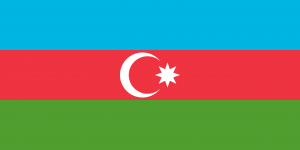Language/North-azerbaijani/Grammar/Future-Tense
Hi North Azerbaijani learners! 😊
In this lesson, we will learn about the future tense in North Azerbaijani grammar. The future tense is used to describe actions that will happen in the future. By the end of the lesson, you will be able to use the future tense in your conversations with native speakers. Let's get started!
After mastering this lesson, these related pages might interest you: Present Tense & Past Tense.
Forming the Future Tense[edit | edit source]
In North Azerbaijani, the future tense is formed by adding the suffix "-açak" or "-əcək" to the present tense of the verb. For example, "gəlmək" (to come) becomes "gələcək" or "gələçək" (will come) in the future tense.
Let's look at some examples:
| North Azerbaijani | Pronunciation | English |
|---|---|---|
| Mən gələcəyəm. | men gel-eh-je-yem. | I will come. |
| O, yəmək yeyəcək. | o, yeh-mehk yeh-ye-jehk. | He will eat food. |
| Biz ora gedəcəyik. | biz ora geh-deh-jik. | We will go there. |
As you can see, the future tense is formed by adding the appropriate suffix to the present tense form of the verb. The pronunciation may vary depending on the dialect of North Azerbaijani.
Using the Future Tense[edit | edit source]
The future tense is used to describe actions that will take place in the future. For example:
Dialogue:
- Person 1: Sabah evdə olacağam. (I will be at home in the morning.)
- Person 2: Ol! (Okay!)
In this dialogue, Person 1 uses the future tense "olacağam" to describe their future action of being at home in the morning. Person 2 agrees and says "ol" which means "okay".
The future tense can also be used to make predictions or talk about future possibilities. For example:
Dialogue:
- Person 1: Sabah işsiz qalacağam. (I will be jobless in the morning.)
- Person 2: Niyə? (Why?)
- Person 1: İşim bitdi. (My job is over.)
In this dialogue, Person 1 uses the future tense "işsiz qalacağam" to describe their future state of being jobless. Person 2 asks "niyə?" which means "why?" to which Person 1 replies "işim bitdi", meaning "my job is over".
Negative Future Tense[edit | edit source]
The negative future tense in North Azerbaijani is formed by adding the negation particle "yox" or "yoxdu" after the suffix "-açak" or "-əcək". For example, "getmək" (to not go) becomes "getməyəcək" (will not go) in the negative future tense.
Let's look at some examples:
| North Azerbaijani | Pronunciation | English |
|---|---|---|
| Mən gəlməyəcəyəm. | men gel-meh-ye-je-yem. | I will not come. |
| O, yəmək yeməyəcək. | o, yeh-mehk yeh-meh-ye-jehk. | He will not eat food. |
| Biz ora getməyəcəyik. | biz ora geh-tmeh-ye-jik. | We will not go there. |
Notice how the negation particle "yox" or "yoxdu" is added after the suffix "-açak" or "-əcək" to form the negative future tense in North Azerbaijani.
Conclusion[edit | edit source]
Congratulations! You have learned how to form and use the future tense in North Azerbaijani grammar. To improve your North Azerbaijani Grammar, you can also use the Polyglot Club website. Find native speakers and ask them any questions! Visit the North Azerbaijani Grammar page for more grammar lessons. Practice using the future tense in your conversations with native speakers to improve your skills.
➡ If you have any questions, please ask them in the comments section below.
➡ Feel free to edit this wiki page if you think it can be improved. 😎
Sources[edit | edit source]
Finished this lesson? Check out these related lessons: Nouns & Plurals.

